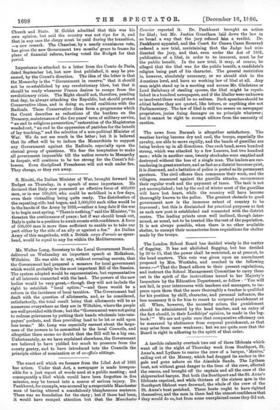The exact evil which we foresaw from the Libel Act
of 1881 has arisen. Under that Act, a newspaper is made irrespon- sible for a just report of words used at a public meeting ; and consequently a libel which would have been forgotten in five minutes, may be turned into a source of serious injury. Dr. Pankhurst, for example, was accused by a respectable Manchester man of having uttered a scandalously blasphemous sentence. There was no foundation for the story ; but if there had been, it would have escaped attention but that the Manchester Courier reported it. Dr. Pankhurst brought an actiom for libel ; but Mr. Justice Grantham laid down the law in so broad a way that the jury refused him a verdict. Dr. Pankhurst appealed, and the Court for Crown Cases Reserved ordered a new trial, maintaining that the Judge had mis- directed the jury, and that, even under the Act of 1881, publication of a libel, in order to be innocent, must be for the public benefit. In the new trial, it may, of course, be alleged that the libel was for the public benefit, a candidate's religion being part of his character. The general restriction is, however, absolutely necessary, or we should sink to the American level, and have no working law of libel at all. Any man might stand up in a meeting and accuse Mr. Gladstone or Lord Salisbury of stealing spoons, the libel might be repub- lished in a hundred newspapers, and if the libeller were unknown or insolvent there would be no redress. Such speeches should be edited before they are quoted, like letters, or anything else not Parliamentary. The law of libel is still too severe on newspaper proprietors, juries fixing damages on no principle whatever ; but it cannot be right to exempt editors from the necessity of caution.










































 Previous page
Previous page